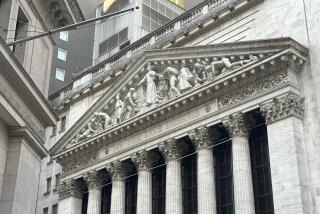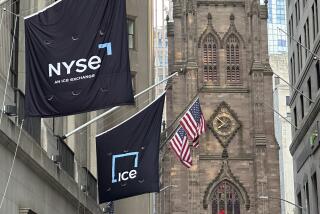No Signs of Recovery in Tech Earnings
Glum quarterly results Wednesday from three computer industry mainstays -- IBM Corp., Apple Computer Corp. and Advanced Micro Devices Inc. -- reinforced the grim outlook offered a day earlier by top chip maker Intel Corp.
Apple and AMD, the No. 2 chip company, both posted losses for the latest three-month period, and profit at IBM fell 18%. None forecast an imminent rebound in consumer or corporate spending on technology products.
“We do not expect our industry to pick up any time soon,” said Apple Chief Executive Steve Jobs, whose company sometimes manages to buck industry trends with a niche appeal.
Cupertino, Calif.-based Apple said it lost $45 million in its fiscal fourth quarter, or 13 cents a share, as soured investments and a 14% decline in shipments of its flagship Macintosh computers reversed a year-earlier profit of $66 million, or 19 cents. Revenue was unchanged at $1.4 billion.
Apple said it would have earned $7 million, or 2 cents a share, without the investment impairments and other one-time events, matching Wall Street expectations. But the stock dipped to as low as $13.38 after hours from a close of $14.56 in regular Nasdaq trading as Apple Chief Financial Officer Fred Anderson predicted only a “slight profit” before more nonrecurring items in the next quarter.
For the full fiscal year, Apple earned $65 million on sales of $5.74 billion, contrasted with a loss of $25 million on sales of $5.36 billion in 2001.
Sunnyvale, Calif.-based AMD’s third-quarter loss widened to $254 million, or 74 cents a share, from $187 million, or 54 cents. Sales crumbled by a third to $508.2 million. Analysts had expected a loss of 67 cents. AMD stock fell 71 cents to $3.49 on the New York Stock Exchange ahead of the earnings results, then gained back 50 cents in after-hours trading.
“We are accelerating our strategy to reset our business model and lower our corporate break-even point,” said Chief Financial Officer Robert Rivet. “We will begin to implement additional and aggressive actions in the fourth quarter.”
IBM likewise said it expected to benefit more from cost cutting than from revenue increases. Chief Financial Officer John Joyce said $900 million in savings next year would more than offset a projected $700-million hit from IBM reducing its estimated returns from investing its pension fund assets.
“We will continue to push productivity, with continued focus on costs and expense,” Joyce told investors and analysts.
Based in Armonk, N.Y., IBM is the world’s largest computer and technology services firm. The company said it would continue to emphasize services and software instead of computer systems, a market in which profit is harder to come by.
In the third quarter, IBM profit fell as losses widened on businesses that IBM is abandoning, including a hard disk drive unit being sold to Hitachi Ltd.
IBM earnings dropped to $1.3 billion, or 76 cents a share, from $1.6 billion, or 90 cents, a year earlier. Sales continued to stagnate, edging up 0.2% to $19.82 billion from $19.78 billion.
On continuing operations, which are tracked more closely by analysts, IBM earned $1.69 billion, down slightly from $1.71 billion. Because IBM bought back 56 million of its shares during the year, the profit per share from continuing operations improved to 99 cents from 97 cents.
On that basis, IBM topped the average Wall Street expectation of 96 cents, according to Thomson First Call. IBM shares fell $3.58 to $64.90 in regular NYSE trading, then reversed course and rose $4.81.
Sales for IBM’s hardware and software businesses fell by 1% and 3%, respectively, less sharply than in recent quarters. Services, IBM’s most profitable division, gained 2% to $8.9 billion in sales.
Joyce said he was comfortable with analysts’ sales and profit projections for the fourth quarter and that the just-completed acquisition of consulting firm PricewaterhouseCoopers should add $1 billion to that quarter’s revenue.
But he said he couldn’t pinpoint when information technology spending will resume its growth, adding, “I wish I could.”






